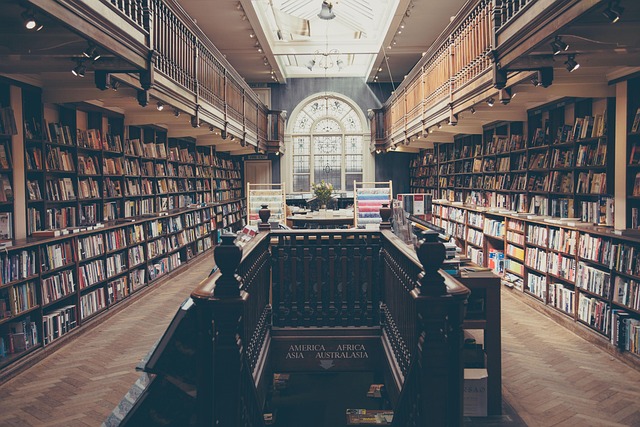By Tim Lambert
Ancient Libraries
A library is a room or a building containing a store of books for members to read. There have been libraries since Ancient Times. As early as 2,500 BC, there were libraries in Ancient Iraq with clay tablets as books (dried in the Sun or baked to make them hard). The Royal Library of Ashurbanipal was created about 600 BC in Iraq. It contained 30,000 clay tablets.
The Greeks and Romans also had libraries. Books were made of papyrus or parchment. The Greeks had private libraries, but the Romans created public libraries (although rich people often had their own private libraries). In Roman public libraries, readers could read the scrolls where they were stored. Roman baths often had libraries. The Persians also created great libraries.
A famous Roman library was the Library of Celsus, built in Ephesus in what is now Turkey. It held 12,000 scrolls. The most famous library of the Ancient World is probably the Library of Alexandria in Egypt. Unfortunately, it gradually declined over the centuries. The Imperial Library of Constantinople was founded in the 4th century AD. Unfortunately, it was destroyed in 1204.
The Sassanid Empire ruled what is now Iran and Iraq from 224 to 651 AD. They had many libraries. The most famous was the Library of Ctesiphon in what is now Iraq.
Medieval and Renaissance Libraries
The Chinese also had libraries. They invented paper, and in the 11th century, they invented movable type. During the Middle Ages, there were also great libraries in the Islamic world and in India and Southeast Asia.
During the Middle Ages, many monasteries had libraries. Books were often chained in place to prevent people from stealing them! A monk called an armarius looked after the books. However, monasteries did sometimes lend books. In 1212, a church council, the Council of Paris, said that lending books was ‘one of the chief works of mercy’. In other words, it was a very kind act.
In the late Middle Ages and afterward, many rich people in Europe had their own private libraries. The invention of the printing press in Europe in the 15th century made books much cheaper and more widely available.
During the 16th and 17th centuries, many famous libraries were founded. The Francis Trigge Library was founded in Grantham in 1598, and it was open to everyone. The Bodleian Library in Oxford opened in 1602. Chetham’s Library in Manchester opened in 1653.
In Rome, the Vallicellian Library was founded in 1565. The Biblioteca Angelica was founded in 1604.
The oldest library in America is Harvard University Library, founded in 1638. A man named John Harvard donated his collection of books to the university.
Reading was also a popular pastime in the 18th century, and the first novels were published at this time. Books were still expensive, but in many towns, you could pay to join a circulating library. In America, Benjamin Franklin founded the first lending library in Philadelphia in 1731.
National Libraries were created in the 18th century. The British Library was founded in 1753. In France, the Bibliothèque Nationale was founded in 1368 as a royal library by King Charles V. It opened to the public in 1692. It was renamed the Bibliothèque Nationale in 1795. Catherine the Great, Empress of Russia, founded the Imperial Public Library in 1795. It was renamed the National Library of Russia in 1992. In America, the Library of Congress was founded in 1800.

Modern Libraries
In Britain, in the early 19th century, mechanics institutes were founded in many towns to educate working men. Often, they had libraries.
In Britain, the Public Libraries Act 1850 allowed Boroughs to create public libraries. In Britain, the first publicly funded, free library opened in Manchester in September 1852. Other cities followed.
In America, the first taxpayer-funded free public library opened in Peterborough, New Hampshire, in 1833.
During the 19th century, school libraries became common.
The Industrialist and Philanthropist Andrew Carnegie (1835-1919) built more than 2,500 libraries in Britain, the USA, and Canada at his own expense. The first public library in Britain funded by Carnegie opened in Dunfermline, Scotland, in 1883.
The Dewey Decimal system of classifying books was first published in 1876. The same year, the American Library Association was formed, and the Library Journal was first published.
In the early 21st Century, many libraries in Britain offered public access to the internet. The latest development is digital libraries. You can borrow eBooks and eAudiobooks from them without leaving your home. Today, public libraries are still an essential service to the community.